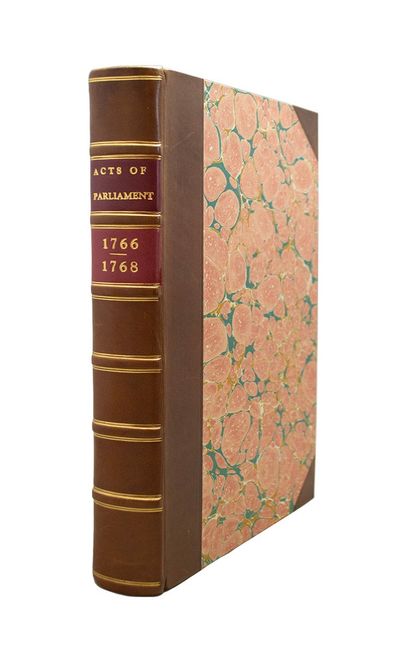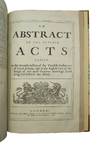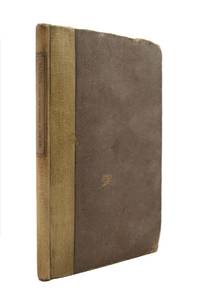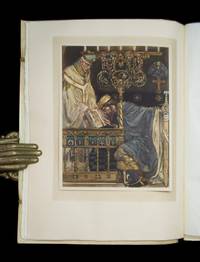first edition
1766 · London
by AMERICAN REVOLUTION
London: Mark Baskett, 1766. AMERICAN REVOLUTION. London: Mark Baskett, 1766, 1767, 1768.
First edition. Three years, bound together in one quarto volume (12 1/8 x 7 5/8 inches; 307 x 195 mm. 171, [1, blank], [2, contents], [2, blank]; 192, [2, contents]; 104, [2, contents] pp. With approximately twenty-two acts related to America and the American colonies. Most notably, the repeal of the Stamp Act in 1766 (Found on page 39 of volume I), as well as the Declaratory Act (page 40 of volume I) and the Townshend Acts. (Found throughout volumes II and III). With a final contents leaf for each volume.
Quarter modern calf over marbled paper boards. Spine with two red leather spine labels, lettered in gilt. Spine ruled in gilt. Edges speckled red. Leaves with stab-holes present. Title-page to 1767 a bit soiled. Otherwise, a very good clean copy of these three years bound together.
Vol I-Abstracts of fifty-four acts printed in the official black letter set of Public General Acts passed in the Parliamentary session 17 Dec. 1765 - 6 June 1766. Vol II- Abstracts of fifty-nine acts printed in the official black letter set of Public General Acts passed in the Parliamentary session 11 Nov. 1766 - 2 July 1767. Vol III- Abstracts of thirty-three acts printed in the official black letter set of Public General Acts passed in the Parliamentary session 24 Nov. 1767 - 10 March 1768.
An interesting and important volume comprising three years of Parliamentary Acts of the Twelfth Parliament of Great Britain. These three sessions (the Fifth, Sixth and Seventh) contain approximately twenty-two acts pertaining to the American colonies, mainly around the subjects of import duties and customs. Most notably are the Repeal of the Stamp Act of 1765, the Declaratory Act and the Townshend Acts.
"Relations between the American colonists and the British government came to a head after the British success against France in the Seven Years War of 1756-63. It was an expensive war and the French lost all their North American possessions including Quebec in what is now Canada, and all the land they claimed between the Appalachian Mountains and the Mississippi River. The British needed to station a large army in North America as a consequence and on 22 March 1765 the British Parliament passed the Stamp Act, which sought to raise money to pay for this army through a tax on all legal and official papers and publications circulating in the colonies. The Act resulted in violent protests in America and the colonists argued that there should be "No Taxation without Representation" and that it went against the British constitution to be forced to pay a tax to which they had not agreed through representation in Parliament. The Stamp Act became one of the most controversial laws ever passed by Parliament, and after several months of protests and boycotts which damaged British trade, it was repealed on 18 March 1766. The Act's repeal, however, was followed that same day with the Declaratory Act, which maintained that the British Parliament had the right and authority to legislate for the colonies in all cases whatsoever." (Parliament dot UK).
"Under the power of this legislation, the British government passed a series of policies in 1767 that were designed to raise revenue and enforce the Crown’s authority over the American Colonies. This series of legislative acts, which became known as the Townshend Acts, included the Revenue and Indemnity acts of 1767. The Revenue Act imposed an indirect tax on the Colonies by levying duties on various imported goods, including tea. The legislation also taxed paper, paint, lead and glass, which were not produced in the Colonies. These items could only be procured via importation from Great Britain. The Indemnity Act provided a tax break to the British East India Company. The goal was to make the company’s tea more competitive with tea smuggled from the Dutch East Indies. These acts raised the price of tea and hurt Colonial shipping companies. The Revenue Act reinforced the legality of writs of assistance, or general search warrants, which gave government officials broad power to enter and search private property for smuggled goods. The legislation also reinforced the Quartering Act of 1765, which required colonists to provide housing and supplies to British soldiers... Although portions of the Townshend Acts were repealed, the tax on tea and special indemnity awarded to the British East India Company was retained. The 1773 Tea Act enabled the company to import tea directly into the Colonies, which furthered harmed Colonial shipping companies. This legislation set the stage for the Boston Tea Party, a pivotal moment on the path toward American independence." (Boston Tea Party Ship dot com).
A few other interesting Acts to note, unrelated to American are: Found on page 51 of Volume II is the "Act to enable the Trustees of the British Museum to exchange, sell, or dispose of, any Duplicates of printed Books, Medals, Coins, or other Curiosities; and for laying out the Money arising by such Sale in the Purchase of other Things that may be wanting in, or proper for, the said Museum." and found on page 70 of Volume II, is the "Prohibiting the Importation of Books reprinted Abroad and first composed, written, and printed, in Great Britain."
ESTC T150492, T150520, T150515
HBS 69363.
$5,000. (Inventory #: 69363)
First edition. Three years, bound together in one quarto volume (12 1/8 x 7 5/8 inches; 307 x 195 mm. 171, [1, blank], [2, contents], [2, blank]; 192, [2, contents]; 104, [2, contents] pp. With approximately twenty-two acts related to America and the American colonies. Most notably, the repeal of the Stamp Act in 1766 (Found on page 39 of volume I), as well as the Declaratory Act (page 40 of volume I) and the Townshend Acts. (Found throughout volumes II and III). With a final contents leaf for each volume.
Quarter modern calf over marbled paper boards. Spine with two red leather spine labels, lettered in gilt. Spine ruled in gilt. Edges speckled red. Leaves with stab-holes present. Title-page to 1767 a bit soiled. Otherwise, a very good clean copy of these three years bound together.
Vol I-Abstracts of fifty-four acts printed in the official black letter set of Public General Acts passed in the Parliamentary session 17 Dec. 1765 - 6 June 1766. Vol II- Abstracts of fifty-nine acts printed in the official black letter set of Public General Acts passed in the Parliamentary session 11 Nov. 1766 - 2 July 1767. Vol III- Abstracts of thirty-three acts printed in the official black letter set of Public General Acts passed in the Parliamentary session 24 Nov. 1767 - 10 March 1768.
An interesting and important volume comprising three years of Parliamentary Acts of the Twelfth Parliament of Great Britain. These three sessions (the Fifth, Sixth and Seventh) contain approximately twenty-two acts pertaining to the American colonies, mainly around the subjects of import duties and customs. Most notably are the Repeal of the Stamp Act of 1765, the Declaratory Act and the Townshend Acts.
"Relations between the American colonists and the British government came to a head after the British success against France in the Seven Years War of 1756-63. It was an expensive war and the French lost all their North American possessions including Quebec in what is now Canada, and all the land they claimed between the Appalachian Mountains and the Mississippi River. The British needed to station a large army in North America as a consequence and on 22 March 1765 the British Parliament passed the Stamp Act, which sought to raise money to pay for this army through a tax on all legal and official papers and publications circulating in the colonies. The Act resulted in violent protests in America and the colonists argued that there should be "No Taxation without Representation" and that it went against the British constitution to be forced to pay a tax to which they had not agreed through representation in Parliament. The Stamp Act became one of the most controversial laws ever passed by Parliament, and after several months of protests and boycotts which damaged British trade, it was repealed on 18 March 1766. The Act's repeal, however, was followed that same day with the Declaratory Act, which maintained that the British Parliament had the right and authority to legislate for the colonies in all cases whatsoever." (Parliament dot UK).
"Under the power of this legislation, the British government passed a series of policies in 1767 that were designed to raise revenue and enforce the Crown’s authority over the American Colonies. This series of legislative acts, which became known as the Townshend Acts, included the Revenue and Indemnity acts of 1767. The Revenue Act imposed an indirect tax on the Colonies by levying duties on various imported goods, including tea. The legislation also taxed paper, paint, lead and glass, which were not produced in the Colonies. These items could only be procured via importation from Great Britain. The Indemnity Act provided a tax break to the British East India Company. The goal was to make the company’s tea more competitive with tea smuggled from the Dutch East Indies. These acts raised the price of tea and hurt Colonial shipping companies. The Revenue Act reinforced the legality of writs of assistance, or general search warrants, which gave government officials broad power to enter and search private property for smuggled goods. The legislation also reinforced the Quartering Act of 1765, which required colonists to provide housing and supplies to British soldiers... Although portions of the Townshend Acts were repealed, the tax on tea and special indemnity awarded to the British East India Company was retained. The 1773 Tea Act enabled the company to import tea directly into the Colonies, which furthered harmed Colonial shipping companies. This legislation set the stage for the Boston Tea Party, a pivotal moment on the path toward American independence." (Boston Tea Party Ship dot com).
A few other interesting Acts to note, unrelated to American are: Found on page 51 of Volume II is the "Act to enable the Trustees of the British Museum to exchange, sell, or dispose of, any Duplicates of printed Books, Medals, Coins, or other Curiosities; and for laying out the Money arising by such Sale in the Purchase of other Things that may be wanting in, or proper for, the said Museum." and found on page 70 of Volume II, is the "Prohibiting the Importation of Books reprinted Abroad and first composed, written, and printed, in Great Britain."
ESTC T150492, T150520, T150515
HBS 69363.
$5,000. (Inventory #: 69363)









